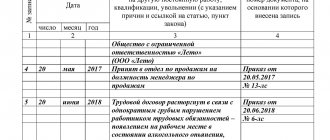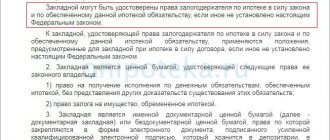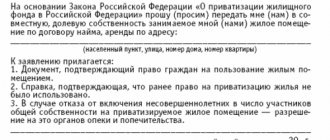20.10.2019
0
1699
4 min.
The main task of law enforcement agencies is to ensure the protection of law and order and the safety of ordinary citizens. Working in them requires a person not only to have physical and psychological stamina, but also obliges him to comply with the position held. An employee should not commit illegal actions or actions that would characterize him in a negative way. Otherwise, he will be dismissed for negative reasons under the Labor Code of the Russian Federation.
Legislation
The main legislative act regulating the issues of service, employment in the Ministry of Internal Affairs, assignment of ranks, leave and dismissal is the Federal Law “On Service in the Internal Affairs Bodies”.
| Article | Description |
| Art. 80 | The grounds for termination of service may be the dismissal or death of an employee |
| Art. 81 | Dismissal is carried out through termination of the contract |
| Art. 82 | The contract is terminated on the basis of termination, the employee reaching the maximum age of service, length of service, at the initiative of the employee, by agreement of the parties, in connection with a change in the terms of the contract and the subsequent refusal of the police officer to work according to the new rules |
| Art. 84 | An employee who decides to resign must submit a corresponding report one month before the date of termination of the contract |
Important! According to the provisions of Art. 84 of the Federal Law “On Service in the Department of Internal Affairs”, if public money was spent on a citizen’s education, provided that he works in the Ministry of Internal Affairs, upon termination of the contract he is obliged to return all funds. The amount is calculated proportionally based on the remaining years he has already served. You do not need to reimburse training costs if:
- The employee cannot continue to serve in his previous position for medical reasons, and there is no possibility of transferring him to a more suitable place.
- An employee has a need for constant care for a close relative of retirement age or a disabled person of group 1 or 2. A medical and sanitary examination report must be present.
- If a police officer needs to care for a minor child whom he is raising alone.
If after one month the contract is not terminated for some reason, and the employee does not insist on this, it is considered valid under the same conditions.
Is it legal to fire for negative reasons?
Dismissal for negative reasons
I have been working in a private company for several years. During the crisis, the management changed - a rather young girl who disliked me became the boss. Several times I have already received an offer to resign of my own free will, but finding a job is now difficult - so I’m holding on to my job, I don’t want to resign on my own, even though the environment in the workplace is not the most pleasant. The boss brings up the conflict, in the heat of a quarrel she said: “If you don’t quit on your own, I’ll fire you for negative reasons, for example, for absenteeism!”, although I don’t even go on sick leave, much less skip work. Her colleagues are afraid of her, I believe that if the question arises of testifying against me just to keep my job, they will do it. What to do in such a situation?
Konstantin S., customer service manager
Dismissal for negative reasons includes a whole list of reasons why an employment contract with an employee of an enterprise may be terminated. This is a gross violation of discipline, loss of trust, committing an offense that discredits honor and dignity. However, the definition itself applies more to employees of the Ministry of Internal Affairs, the procedure for dismissal of whom is prescribed in the Federal Law “On Service in the Internal Affairs Bodies of the Russian Federation.” In this case, they are threatening to fire you for absenteeism, which means you should make sure that it is extremely problematic for your boss to do this.
First of all, you should make it a rule to make short videos of yourself coming and leaving work, indicating the date and month. In addition, come and go to work with witnesses - these can be not only colleagues, but also clients, clients, customers, employees of organizations that neighboring your organization can testify in your favor, so record daily who you communicate with, and in what way. For example, you work in 1C programs: when you enter data into the program, the “Executor” attribute is reflected, and the register of entered documents can be printed from the program.
In the current situation, you need to coordinate all your absences from work, as well as leaving work early and arriving later, with your employer. The paperwork has the form of a document - a statement. Thus, for each case, you must have a copy of the document on hand, which will indicate the incoming number and the official’s mark on acceptance of this application, in addition, the resolution “I agree” of the manager.
If management sends you on a business trip, there must be an order to send the employee on a business trip. Do not succumb to provocations if they tell you that you are not allowed to enter the workplace without providing any documents confirming your removal from work - there is no such thing as verbal dismissal. If you are told that you have been fired and may not go to work, then you need to go to work, be at the workplace, and record this fact. If an employee is not allowed to participate in the work process, an order must be issued and legal grounds must be indicated, in accordance with Article 76 of the Labor Code of the Russian Federation.
When a conflict with an employer begins, it is necessary to find out the telephone numbers of the state labor inspectorate and the prosecutor’s office. If management has stopped allowing an employee to enter the workplace, or it has been verbally stated that the employee has been fired, then it is necessary, in the presence of the employer, to call these authorities, very briefly describe the situation, give your full name, the name of the organization, its address, and information about the head of the organization. If the conflict is not resolved, then you need to submit written statements regarding this fact in person or via the Internet.
Author of the material: Nadezhda Folomkina.
What are negative motives?
Police officers can be fired for negative reasons.
Article 58 of the Service Regulations lists the circumstances that do not allow a person to remain in law enforcement:
- the presence of a final conviction against the police officer;
- termination of a criminal case due to amnesty, reconciliation of the parties, expiration of the statute of limitations for bringing a police officer to criminal liability;
- significant disregard for labor discipline standards;
- use of false documents and false information for employment and future career advancement;
- loss of honor and dignity by an officer, committing acts that contradict the legal requirements for the moral character of an employee of internal affairs bodies;
- violation of Russian laws, regulations, instructions of the ministry;
- repeated failure to comply with discipline in the presence of a valid penalty.
Dismissal from the police (formerly the police) for negative reasons is inevitable when committing a criminal offense on the basis of a sentence that has entered into force. If the accused is placed in custody during the preliminary investigation, he will be excluded from the internal affairs bodies on the day of arrest.
The legislator considers the following to be a significant disregard for labor discipline standards:
- failure to comply with the rules for storing and using service weapons and ammunition;
- being on duty after using drugs or being intoxicated;
- absence from work without a valid reason for four hours;
- non-compliance with information storage standards;
- refusal of medical examination required by law;
- refusal to undergo mandatory certification;
- targeted destruction or damage to official property;
- carrying out illegal actions against citizens;
- violation of safety rules that triggered serious consequences - a fire, accident, injury, or provoked the threat of such consequences;
- public negative, insulting statements about members of the government, government officials at any level, and superiors;
- non-compliance with standards for working with material assets and funds;
- refusal to provide citizens with any information related to personal gain;
- non-compliance with contract provisions;
- violation of Russian legislation.
We suggest you read: Does the defendant have the right to appeal the decision of the arbitration court
? It is inevitable that an employee will be dismissed for presenting false documents for the purpose of employment or promotion. It does not matter what document we are talking about - a school certificate, a diploma of higher education, a work record book.
The task of police officers is to protect the population, legal entities from criminal attacks and comply with the law. This important mission determines a person’s personal qualities, without which service in the authorities is impossible.

Article 13 of Federal Law No. 342 of November 30, 2011 requires that an employee of internal affairs bodies, on duty and during off-duty hours, behave with dignity, without spoiling the reputation of either his own or the department as a whole. A police officer should not make decisions or take actions aimed at obtaining personal gain.
His actions must be thoughtful, selfless, and fair. The provisions of Article 82 of the above-mentioned law call dismissal the only measure of influence on an employee who has discredited his honor and dignity.
Grounds for dismissal include circumstances that led to a loss of confidence in the employee:
- simultaneously served in the police and was engaged in entrepreneurial activities;
- held a management position in a commercial company whose goal is to make a profit;
- entered false information into the income declaration, concealed the presence of an additional source of profit, property not only of his own, but also of his spouse or minor child;
- violated the law regulating the rules for storing money in foreign bank accounts (the norm applies to the spouse and minor children of a police officer);
- is a member of the board of a foreign non-profit organization operating in Russia;
- extracts self-interest and personal gain from the situation that has developed in the service;
- knows (may know) about the selfish actions and personal interests of the subordinate, but does not stop his activities.
An employee can be dismissed on such grounds only if there is direct intent, established during an internal audit or by a court verdict.
Job loss is threatened for violations of contractual obligations associated with the employee’s lack of the necessary education, failure to fulfill job duties, abuse of official position, or ignoring job descriptions.
Features of dismissal of a police officer
The law does not provide an exhaustive definition of the concept of “offense discrediting honor.” At the same time, this is one of the independent grounds for termination of service, enshrined in Federal Law No. 342 of November 30, 2011. An explanation of what is considered such an action is given by the Constitutional Court of the Russian Federation in ruling No. 1486-O dated July 3, 2014. The reason for dismissal is an act that directly affects the authority of the internal affairs bodies and is contrary to the requirements imposed on employees of the Ministry of Internal Affairs, regardless of whether administrative or criminal liability is provided for it or not.
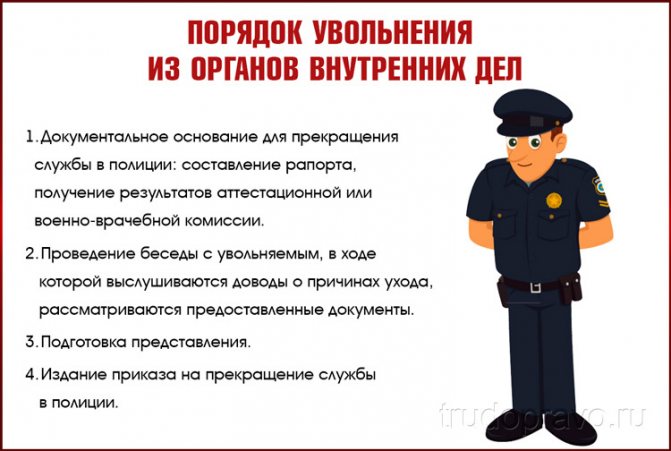
Grounds for dismissal
The dismissal of a police officer for committing a disgraceful offense requires an investigation and establishment of all the circumstances of the case. The accusation is quite serious, so it is not used without significant reasons. An objective assessment of the committed act allows management to make a decision regarding the advisability of removing a person from further service. Dismissal is made if the following grounds exist:
- Submitting a report for care at your own request.
- Retiring early if you have sufficient experience
- Providing knowingly false information when joining the police.
- Repeatedly committed disciplinary action, documented, and not removed by management.
- Expiration of the concluded contract with internal authorities.
- Dismissal due to length of service from the police.
- Violation of a number of clauses of the employment contract.
- Reorganization or reduction of staff in the department (usually a transfer is proposed).
- The commission of a criminal offense for which a court decision has been made that has entered into legal force.
- A sharp deterioration in health that does not allow continued service.
- Inconsistency with the position held, as determined by the results of the certification commission.
- Loss of trust in a person as a result of committing an act that discredits honor.
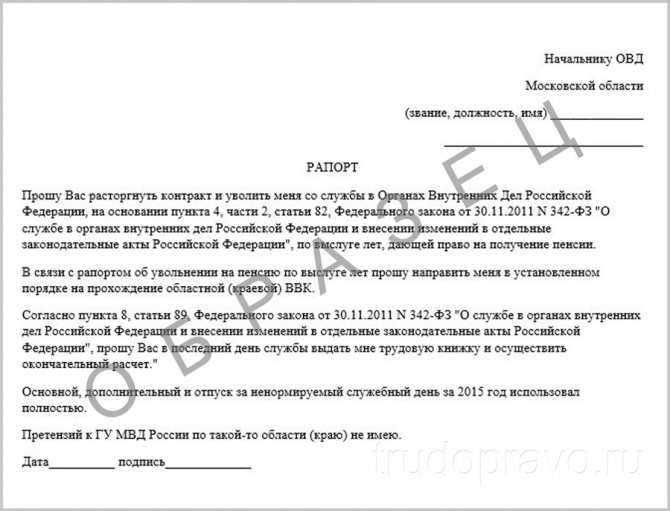
It is important to know! The dismissal of a police officer will have its own characteristics in each individual situation. It is important for the employer to follow the procedure, otherwise there is a risk of appealing the decision in court.
What are considered negative motives?
Negative motive is not often used as a basis for dismissing a police officer. Article 58 of the Service Regulations, approved by Resolution of the Supreme Court of the Russian Federation No. 4202-1 of December 23, 1992, lists the main situations that should be classified as acts discrediting honor:
- The existence of a final conviction.
- Bringing a police officer to criminal liability under any article of the code.
- Neglect of labor discipline standards approved by internal documents.
- Using false documents for employment or promotion.
- Violation of Russian laws, regulations or decrees of the Ministry (not only the Ministry of Internal Affairs).
- Committing crimes for selfish reasons.
Federal Law No. 342 of November 30, 2011 requires a police officer to maintain dignity not only during working hours, but also when not on duty. He is prohibited from abusing his position or deriving personal benefit from his position in the Ministry of Internal Affairs. Dismissal is a negative consequence, a measure of punishment and influence on a police officer who behaved inappropriately in a particular situation.
When is it impossible to resign from the Ministry of Internal Affairs?
Art. 35 of the Federal Law “On Service in the Department of Internal Affairs” describes a number of reasons why an employee cannot initiate dismissal at will:
- During a designated martial law or state of emergency.
- In the event of an armed conflict or a counter-terrorist operation.
- When eliminating the consequences of an emergency.
If a police officer refuses to fulfill the terms of the contract, this is grounds for dismissal from the position being filled and dismissal from service on the basis of paragraph 13, paragraph 1 of Art. 82 Federal Law “On the Service...”.
The procedure for dismissing an employee from internal affairs bodies
To apply for a long-service pension from law enforcement agencies, certain conditions are required. They are regulated by law.
For this there must be:
- The maximum length of service for the possibility of receiving a military pension has been developed, which is 20 years.
- The employee has reached the retirement age specified for law enforcement officers, that is, 45 years or more.
- General experience of 25 years or more, and specifically in service in the Ministry of Internal Affairs - 12.5 years minimum.
From 2011 to 2021, social protection of retired employees was provided by Federal Law No. 247. Since April 2018, some changes have been made there. They relate to increasing experience. It is expected to be increased by five years. As a result, instead of 20 people, they will serve in the Ministry of Internal Affairs for 25 years.
Employees are required to notify of resignation two months before the designated date of termination of the contract. Upon termination of employment, an employee with 20 years of service or more is entitled to a one-time payment equal to his 7 salaries for that day.
Expressing a desire to resign from the authorities, an employee has the right to undergo a military and military examination within the framework of Regulation No. 565 of the Russian Government. The conclusions of doctors will help determine the person’s health status and the possibility of further service in law enforcement agencies. The commission is called upon to determine the category of illnesses, injuries and their consequences acquired during service. Based on the doctors’ conclusion, it will be possible to outline the basis for termination of work.
We invite you to read: Exemption from paying child support when the court approves
To conduct a medical commission, you must adhere to the procedure for passing the IVC at the Ministry of Internal Affairs upon retirement:
- The IHC should be carried out 60 days before dismissal.
- Notices about the date of contract termination and medical examination are issued simultaneously.
- If the medical examination is not completed immediately, it can be completed after retirement within one year. To do this, you will have to contact the personnel service at your place of duty.
When submitting an application for dismissal, the employee must reflect in the report his desire to undergo or not undergo the IVC. But we must remember that passing the IHC upon retirement from the Ministry of Internal Affairs and the conclusions drawn by doctors can help count on disability and, accordingly, an increase in the size of the pension.
To pass the commission, you can go to the clinic at your place of residence or at a medical institution under the Ministry of Internal Affairs.
The list of certificates for registration of resignation from the bodies of the Ministry of Internal Affairs is prepared by the personnel service. And all documentation and copies thereof are transferred to the pension service of the Ministry of Internal Affairs to the employees themselves.
Documents must be examined no more than ten days from the time they are submitted. The order to terminate the employee’s labor activity is signed by the head of his internal affairs department. From the moment it is signed and the employee actually leaves service, the calculation of the long-service pension begins.
Dismissal due to an offense that discredits the honor of a police officer, malicious violation of discipline, or other negative grounds is possible only after the completion of a special internal investigation.
During the investigation, the fact of the violation, the involvement of a certain employee, and the degree of guilt are established. The conduct of an internal investigation is regulated by the provisions of the Instruction on the procedure for organizing and conducting internal audits in internal affairs bodies.
Upon completion of the inspection, a conclusion is drawn up. It takes into account the conditions under which the act was committed, its severity, the reputation of the police officer, previous merits, and awareness of guilt. The resolution indicates the qualification of the offense and the name of the penalty applied.
The employee is familiarized with the order, and, if necessary, with the conclusion and materials of the inspection. From this moment the penalty is considered imposed. Two months before dismissal from service, the employee is given a notice containing his personal data, the reason and date of dismissal, due payments, information about the performer, his signature and seal.
The document is handed over against signature. The personnel service prepares a submission from the internal affairs bodies and submits it to management for consideration. Measures are being taken to remove the employee from the federal register.
The employee is introduced to the text of the presentation. A corresponding entry is made in the work book indicating the exact period of service. Upon dismissal, the medical insurance policy remains with the employee; there is no need to hand it over.
Dismissal is a legal process that involves respecting the rights of a citizen. The employer must hand him a work book on the last working day and make the payments due, regardless of the reason for dismissal. Additionally, the employee is given
income certificate
, a certified copy of the dismissal order, medical examination reports, acts (if available).
Dismissal due to length of service from the police
Labor Code of the Russian Federation.
The employee undertakes to hand over all weapons to his unit, and his personal badge to the personnel.
For health
Dismissal for health reasons is possible only if a certificate from a medical institution is provided. Only on the basis of this document is it possible to write a report. But the notice must also be one month in advance.
If there are medical contraindications, then termination of service occurs by agreement of the parties.
On the day of termination of work, the citizen is given a paycheck and a work book.
On retire
In this case, retiring is somewhat more difficult than under the standard procedure.
The person writes a report and after that he is sent for a medical examination.
After this, the person is sent to a hospital military medical commission.
In addition, local authorities will be forced to use the services of private security companies, which is fraught with additional costs.
At the same time, the reduction of leadership positions will have virtually no impact on the activities of law enforcement agencies. Optimizing the organizational structure will have a positive effect on the work of the Ministry of Internal Affairs.
The reduction of employees of the Ministry of Internal Affairs as part of the reform of the law enforcement agency will be completed in 2021. The authorities intend to abolish duplicative management positions and reorganize the work of some services. At the same time, officials expect to significantly save budget funds, which will not affect the work of security forces.
Is there a pension?
Upon dismissal from the internal affairs bodies or the army, a statement is drawn up with a mandatory indication of the reason for dismissal, length of service, benefits and social guarantees.
Leaving service for negative reasons if you have the required length of service does not affect the assignment of a long-service pension.
An exception to this rule occurs when, before a pension is granted, an employee is found guilty of committing a crime and, as a punishment, is deprived of a special rank. If at the time of dismissal the length of service has been partially earned, then the right to receive a pension does not arise.
It is not permitted to terminate the payment of an already earned long-service pension due to deprivation of a special rank for a crime committed after leaving law enforcement service. This is confirmed by judicial practice and decisions of the Constitutional Court.
Early dismissal of law enforcement officers
It's no secret that the civil service involves a special procedure for recruitment and, accordingly, release from it.
Service in law enforcement agencies differs from standard work, because employees are subject not only to the Labor Code of the Russian Federation, but also to a number of provisions of Federal legislation, for example, the Law “On the Police” and other laws.
It is worth noting that service in the law enforcement system requires stamina of both psychological and physical types, since it implies ensuring law and order and supervising its observance, which cannot run counter to more complex conditions of service and, as a consequence, additional financial support from states.
Meanwhile, in order for the employee to be provided with the specified additional financial incentive and other social guarantees, the state has provided for a certain procedure for serving, in case of violation of which dismissed employees are deprived of all or part of the guarantees provided by law.
First, let's look at how it is possible to terminate a service contract and what consequences follow, using the example of police officers. Note that in general these consequences are approximately the same for the entire law enforcement system.
The procedure and grounds for terminating a contract for service in internal affairs bodies are determined by the Federal Law of November 30, 2011 No. 342-FZ “On service in internal affairs bodies of the Russian Federation and amendments to certain legislative acts of the Russian Federation”, the Law “On the Police”, Order of the Ministry of Internal Affairs of Russia dated November 30, 2012 No. 1065 “On some issues of appointment to positions in the internal affairs bodies of the Russian Federation and dismissal from service of employees of the internal affairs bodies of the Russian Federation.”
It is objectively clear that termination of a contract can be either on the initiative of an employee or on the initiative of a federal law enforcement agency, while termination can be with the right to retire, i.e. upon reaching a certain length of service, and without the right to a pension, i.e. ahead of schedule.
If everything is determined with the social security of employees dismissed from law enforcement agencies with the right to a pension, then for employees who have served in law enforcement agencies for less than 20 years, the basis for terminating the service contract is of great importance in order to receive appropriate guarantees.
Social guarantees for employees of internal affairs bodies who are dismissed from service are determined by Federal Law No. 247-FZ of July 19, 2011 “On social guarantees for employees of internal affairs bodies of the Russian Federation and amendments to certain legislative acts of the Russian Federation.”
Employees whose total duration of service in internal affairs bodies is 20 years or more, upon dismissal from service in internal affairs bodies, are paid a one-time benefit in the amount of seven salaries, and employees whose total duration of service in internal affairs bodies is less than 20 years upon dismissal from service, a one-time benefit is paid in the amount of two salaries, based on the official salary and the salary for a special rank.
It is worth noting that a one-time benefit is not paid to citizens dismissed from service in internal affairs bodies:
- in connection with a gross violation of official discipline;
- in connection with repeated violations of official discipline if the employee has a disciplinary sanction imposed in writing by order of the head of the federal executive body in the field of internal affairs or an authorized manager;
— in connection with the employee’s refusal to be transferred to a lower position in the internal affairs bodies in order to execute a disciplinary sanction;
— due to violation of the terms of the contract by the employee;
— due to the employee’s failure to comply with the restrictions and prohibitions established by federal laws;
- due to loss of trust;
- in connection with the submission by an employee of forged documents or knowingly false information when joining the service;
— in connection with an employee’s conviction for a crime;
- in connection with the commission of an offense that discredits the honor of an employee of the internal affairs bodies;
- in connection with the employee’s violation of mandatory rules when concluding a contract.
Citizens dismissed from service in internal affairs bodies without the right to a pension, who served in internal affairs bodies and who have a total duration of service in internal affairs bodies of less than 20 years, are paid monthly for one year after dismissal a salary according to a special rank in the manner determined by the Government Russian Federation, in case of dismissal:
- upon the employee reaching the age limit for serving in the internal affairs bodies;
- for health;
- in connection with the reduction of a position in the internal affairs bodies replaced by an employee, or the impossibility of transfer or refusal of an employee to transfer to another position;
— in connection with a violation of the terms of the contract by an authorized manager;
In the event of an increase (indexation) of salaries for special ranks during the one-year period of payment, its size increases accordingly.
Judicial practice shows that early dismissal mainly occurs in the following situations: dismissal from the Ministry of Internal Affairs due to length of service; dismissal for negative reasons; on staff reductions; for health.
The court takes the employee’s side if it is proven that pressure was exerted on him or the management did not make the appropriate calculations.
Meanwhile, legal disputes between employees related to early dismissal for health reasons are of interest, since in this case the possibility of further service in law enforcement agencies is important.
Part 5 of Article 43 of the Law “On the Police” provides for the payment of a one-time benefit in the amount of two million rubles when a police officer receives an injury or other damage to health in connection with the performance of official duties, which excludes the possibility of further service in the police.
Thus, in one of the legal disputes, courts of all instances sided with an employee who was denied payment of a one-time benefit in the amount of 2 million rubles.
The courts indicated that police officers who were injured in connection with their official activities and dismissed under clause 8 of Part 2 of Art. 82 of the Federal Law of November 30, 2011 N 342-FZ “On service in the internal affairs bodies of the Russian Federation and amendments to certain legislative acts of the Russian Federation”, the right to receive a one-time benefit provided for in Part 5 of Art. 43 of the Federal Law of February 7, 2011 N 3-FZ “On the Police”, therefore the very fact of dismissal due to illness is sufficient to recognize the employee’s right to payment of a one-time benefit, regardless of whether the employee can continue to serve in the internal affairs bodies in positions corresponding to his level of education, experience and state of health.
Meanwhile, the judicial panel for civil cases of the Supreme Court of the Russian Federation found the above findings of the courts of first and appellate instances based on the incorrect application and interpretation of substantive law to disputed relations and, by its ruling dated March 30, 2015 No. 12-КГ14-8, canceled the judicial acts and refused to pay the former employee a one-time benefit.
The courts continued to accept similar judicial acts, when employees were unjustifiably deprived of one-time payments, until the Constitutional Court adopted Resolution No. 3-P of March 1, 2017.
In this dispute, all courts, including the Supreme Court of the Russian Federation, sided with the Ministry of Internal Affairs of the Russian Federation, citing the fact that in case of early dismissal, not any health condition entails a one-time payment of 2 million rubles.
In their complaints to the Constitutional Court, the applicants indicated that the contested norm allows for the possibility of refusal to pay the benefits provided for by injured police officers who were dismissed for health reasons on the basis of the conclusion of a medical commission about limited fitness for service and the inability to perform duties in their previous position in the absence of suitable vacancies rates. That is, in their opinion, the specified provision of the Law “On the Police” makes it possible to deprive police officers of benefits who do not have a real opportunity to continue serving.
The Constitutional Court indicated that, taking into account the universality of the constitutional principle of equality, all employees of internal affairs bodies recognized as partially fit for service must be placed in equal conditions.
In other words, the court made it clear that those who voluntarily left the service for health reasons and those who did not have the right to choose should be provided with the same guarantees. Moreover, according to the Constitutional Court, the federal legislator has the right to differentiate the amount of such benefits depending on the degree of injury received by the police officer and the degree of loss of his ability to serve in the police department.
Canceling all judicial acts, the Constitutional Court concluded that the norm challenged by the applicants does not contradict the Constitution of the Russian Federation, since it does not prevent the payment of a one-time benefit to an employee of the internal affairs bodies who was injured in the service and dismissed for health reasons without the possibility of moving in the service. The exception is cases where the dismissal was preceded by the employee’s refusal to be transferred to another position suitable for him due to health reasons.
Thus, the Constitutional Court restored the broken balance between the interests of the state and law enforcement officers who suffered in the service.
Is it possible to quit without working?
https://www.youtube.com/watch?v=J5FJtUUmgC8
Employees of the Ministry of Internal Affairs are subject to the provisions of the Federal Law “On Service in the Department of Internal Affairs”, and not the norms of the Labor Code of the Russian Federation, where, upon dismissal on their own initiative, an employee is necessarily exempt from two weeks of service if there are good reasons (enrollment in an educational institution, relocation, etc.).
Here it is important to comply with one condition specified in paragraph 4 of Art. 84 Federal Law No. 342-FZ: before the expiration of the mandatory service period, an employee may be dismissed with the permission of the manager.
There is another option - termination of the contract by agreement of the parties (Article 83 of the Federal Law “On Service”), where a specific date for leaving service will be indicated in advance.
We suggest you read: You can live under temporary registration before purchasing an apartment
Appeal against termination of employment relationship
The decision to dismiss for negative reasons can be challenged in court.
- bringing an employee to disciplinary action while on sick leave;
- violation of deadlines for issuing a penalty or dismissal;
- non-compliance with the methodology for performing an internal audit, the dismissal procedure and the rules for drawing up related documents;
- management’s reluctance to familiarize the dismissed employee with all the materials of the audit conducted against him;
- disciplinary action is not commensurate with the gravity of the act.
A statement of claim must be filed with the court at the location of the employer, containing information about the applicant and the defendant, and the reasons for disagreement with the dismissal. It is advisable to attach supporting documents to the document. The period for appealing the manager’s illegal decision to dismiss for negative reasons is one month. The period is calculated from the date of receipt of the order.
Dear readers, the information in the article may be out of date, please take advantage of a free consultation by calling: Moscow, St. Petersburg or using the feedback form below.
Features of the process of dismissal from the Ministry of Internal Affairs: procedure, payments and deadlines
In the life of a modern person, professional orientation and work are the determining factors in building life. Working in the internal affairs bodies is quite honorable.
But it can always happen that a person will be forced to change his occupation. How this happens will be discussed in the article below.
Dear readers! Our articles talk about typical ways to resolve legal issues, but each case is unique.
If you want to find out how to solve your particular problem, please use the online consultant form on the right or call. It's fast and free!
Compensations and payments upon dismissal from the Ministry of Internal Affairs at one's own request
| View | Description |
| One-time benefit | With 20 or more years of service - 7 salaries, less than 20 years - 2 salaries |
| Salary | Calculated in proportion to time worked |
| Quarterly bonus | |
| Compensation for vacation days not taken off | Depends on the number of days of rest |
| Award for conscientious performance of official duties | Based on the results of work for the year in which the dismissal is made |
Common Mistakes
Mistake #1. You can terminate the contract at your own request without completing the required period, if there are good reasons
Termination of the contract is carried out on a general basis, and the presence of valid reasons is not provided for here.
Mistake #2. You can resign from the Ministry of Internal Affairs on a specific date only by agreement of the parties.
No, there are two options here. In the first, after the expiration of the notice period, the employee has the right to resign, and in the second, he has the right to agree with the boss on early dismissal.
FAQ
Question No. 1. Is it possible to resign while on a business trip to the Investigative Committee?
The Investigative Committee in this case is not the main place of work, therefore, in order to be dismissed, you must submit a report to your immediate management. You can terminate the contract because a business trip to the TFR is not service under martial law.
Question No. 2. What to do if the employee is not fired after the mandatory service period has expired?
He has the right not to go to work, but full payment must be made to him on the last day of his work. If this condition is not met, he can go to court or try to resolve everything peacefully.
